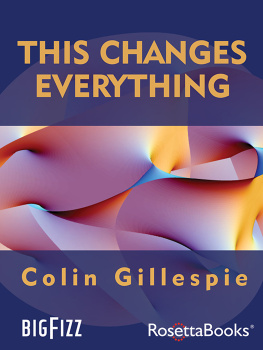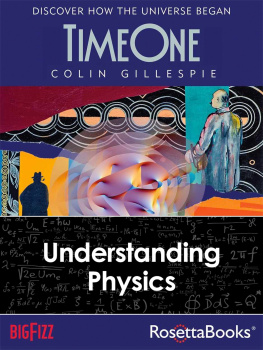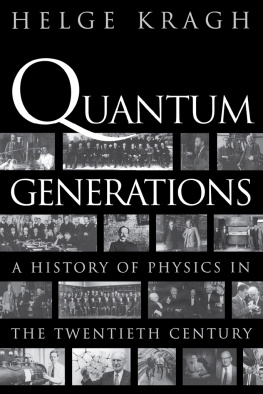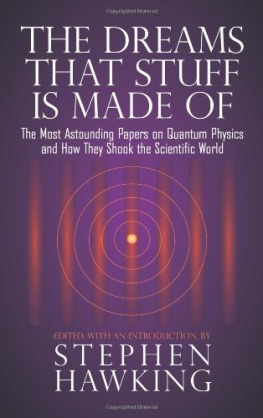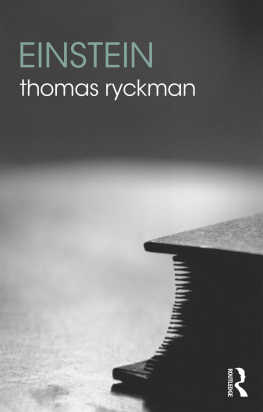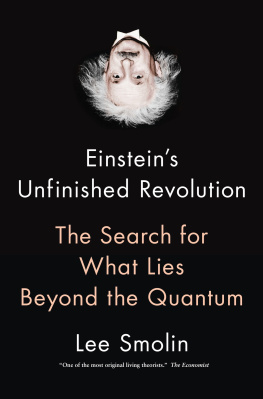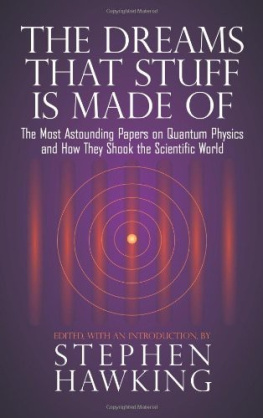This Changes Everything
Colin Gillespie
From the author of Time One: Discover How the Universe Began
New views on the physics, philosophy and religious thinking that matter to us all
Copyright
This Changes Everything
Copyright 2012 by Colin Gillespie
Cover art to the electronic edition copyright 2012 by RosettaBooks, LLC.
All rights reserved. No part of this book may be used or reproduced in any form or by any electronic or mechanical means, including information storage and retrieval systems, without permission in writing from the publisher, except by a reviewer who may quote brief passages in a review.
Electronic edition published 2012 by RosettaBooks, LLC, New York.
ISBN ePub edition: 9780795332692
Contents
Everything that everybody relies on unthinkingly today, the entire economy, is substantially dependent upon physics that has been done in the last hundred years. Most of it is substantially dependent on physics that was done between 1905 and 1915. And there hasnt been much of great substance done since then that effects the lives of ordinary people. That is widely regarded as an unfinished scientific revolution. It got stuck. It got stuck in two Theories of Everything. General relativity describes everything. Quantum mechanics describes everything. But they are completely contradictory. They not only dont speak the same languagethey cant even be translated into each other.
So at least one of them is wrong. I think most physicists would say probably both, that probably each of them is an approximation of some sortin much the same way as the physics in the days of Newton, approximated themand that today there is brewing a new revolutionary step.
Quantum mechanics turned our view of the world upside down. If you were to take quantum mechanics out of the world today, it would collapse. Civilization as we know it would stop. The entire life of every person on the planet these days is what it is because of physics. Physics has transformed our lives: past tense. Physics today continues to transform our lives: present tense. Physics will continue to transform our lives, whatever happens to it: future tense. And yet its something that not only do most of us think we have no say in, but we dont even think we can grasp what it is to have a say. I dont think thats right, but to demonstrate how its not right, to make it different, requires that people have two things. One is the confidence that we can, so that we tryand secondly, the common language so that when we try, we find that we actually can have a say.
Let me give an example. Most people conceive of spaceif they think of it at all, and many dontas infinite. I would bet that if you lined up a hundred physicists, ninety of them would say they agree that space is infinite. Well, space isnt infinite, if I am right about any of this. It comes in tiny pieces and there is a finite, exact number of pieces of space at any given instant. It increases because they tend to split into two pieces; thats why space is still expanding. But its a number. And you can write it down on a sheet of paper without having to cramp your handwriting. Its a big number but not an impossibly big number.
Space is vast enough that even with a Hubble telescope you cant see all of it, because there hasnt been enough time for the light to get here from everywhere in space. But it is finite. Well thats a whole different notion. When you add to that that every atom in you, and every piece of every atom in you, is directly connected to every one of those pieces of space, youve got a different concept of yourself and your place in the world. Maybe in somewhat the same sense as when people first saw that blue earth rising over the moonit just gave people a different perspective on things. I think that kind of stuff matters in peoples lives.
The physics story is a history of an unfinished scientific revolution that has changed everybodys lives but hasnt finished doing that job. The missing part is simply the final steps of coming to grips with the reality of the universe as it is. Sciencephysics in particularknows that it hasnt got there and doesnt yet know how it can.
The only place to start a Theory of Everything is at everythings beginning. I dont think youd have a tough job persuading most physicists of that. It is curious that most physicists nonetheless either havent gone looking at all or havent gone looking there. The reason isnt all that hard to find. It goes back to the deep divide between religion and physics. Physicists break out in a rash at the notion of anything that they are doing or thinking about doing coming anywhere close to religion. And their instinct is that a beginning to the universe has got to be something to do with religion.
Now this has been inflamed, accidentally as it turns out, by historical circumstance, right after 1915 when Einstein published his equations of general relativity, which I would just note were in themselves setting out a Theory of Everything (although they didnt turn out to entirely work that way). The current model of the universe came from a solution of those equations by Georges Lematre. He was a Belgian physicist who was also a priest, and thats a combination of roles that has colored cosmology ever since.
You might say that Lematre invented cosmologywith a little help from Einstein in 1917, who wrote the first serious paper on itbut Lematre was widely viewed as having a religious agenda. I think thats not accurate, but his agenda wasnt seriously examined until quite recently. And those who did examine it came to the conclusion that the accusation was not in fact true.
But what happened was very curious. Lematre became, and still is recognized as, the father of the Big Bang theory. His solution of the equations showed an expanding universe. Einstein virtually disowned him because he didnt like that solution. It wasnt until Edwin Hubbles experimental observations, which confirmed it, that Einstein backed down. The equations for what happened after the beginning have become the standard fare of cosmology and indeed these days of astronomy. Everyone knows the universe began with a big bang. Well, actually, it didnt. That, too, I would think all physicists would agree with. They realize that there was something different about the very beginning. Now, Lematre got to it by the simple device of running his equations backwards. And you can do that with physics equations; just run time backwards and they oblige. If you run the equations for an expanding universe backwards, what you find is that everything finishes up at a single point, at some single instant in time. Einstein would have been the first to say that his equations in general relativity certainly do not describe that. He would be the first to reach for a quantum theory and to say that, with anything that small, that peculiar, you need to look at it at a quantum level. So what we are left with today is that the beginning is unexplored, and has been attributed to Georges Lematre the priest, and is consequently out of bounds. And everything after that has become mainstream, and is physics, and is attributed to Georges Lematre the physicist.
I think theres a lot to be re-appreciated about Einstein, and this is not something that is new; thereve been a lot of people studying Einsteins works, his correspondence, his life.
The first thing to note about Einstein is that he was the originator of essentially all of twentieth century physics. Not just the pieces that he is famous forhe wrote five papers in 1905, not just the one on special relativity, and each one of them generated a completely new field of physics. He was an extraordinarily prolific source of ideas. He was also an extraordinarily prolific source of changing his mind. He joked about it. He said, I make my living saying something this year and then saying the opposite next year. Which is strikingly true. The other thing about Einstein was that he was a

